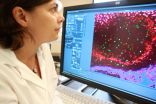(Press-News.org) Led by Georgia State University, researchers have developed the first robust and noninvasive detection of early stage liver cancer and liver metastases, in addition to other liver diseases, such as cirrhosis and liver fibrosis.
Their findings were published Wednesday (May 13) in Proceedings of the National Academy of Sciences.
More than 700,000 people are diagnosed with liver cancer each year. It is the leading cause of cancer deaths worldwide, accounting for more than 600,000 deaths annually, according to the American Cancer Society. The rate of liver cancer in the U.S. has sharply increased because of several factors, including chronic alcohol abuse, obesity and insulin resistance.
"Liver cancers associated with high mortality rates and poor treatment responses are often diagnosed in the late stages because there is not a reliable way to detect primary liver cancer and metastasis at a size smaller than one centimeter," said Jenny Yang, lead author on the paper, Distinguished University Professor and associate director of the Center for Diagnostics and Therapeutics at Georgia State.
The liver is a common site for a variety of cancers, including melanoma, breast, pancreatic and colon cancers. Magnetic resonance imaging (MRI) is the leading imaging technique to detect disease without using radiation. MRI contrast or imaging agents aid MRI techniques to obtain tissue-specific images.
As reported by Yang, the applications of MRI contrast agents are not effective for early detection of cancerous tumors because they are hampered by uncontrolled blood circulation time, low relaxation rate or sensitivity, and low specificity. Most contrast agents, she said, are rapidly excreted from the liver, not allowing sufficient time to obtain quality imaging.
To more effectively detect cancerous tumors at an early stage, researchers from Georgia State, in collaboration with researchers from Emory University, Georgia Tech, the University of Georgia and the University of Virginia, have developed a new class of protein-based contrast agents (PRCAs) and an imaging methodology that provides robust results for the early detection of liver cancer and other liver diseases.
ProCA32, the researchers' newly developed contrast agent, allows for imaging liver tumors that measure less than 0.25 millimeters. The agent is more than 40 times more sensitive than today's commonly used and clinically approved agents used to detect tumors in the liver.
ProCA32 widens the MRI detection window and is found to be essential for obtaining high-resolution quality images of the liver. This application has important medical implications for imaging various liver diseases, the origin of cancer metastasis, monitoring cancer treatment and guiding therapeutic interventions, such as drug delivery.
"Our new agents can obtain both positive and negative contrast images within one application, providing double the accuracy and confidence of locating cancerous tumors," Yang said. "These agents are also expected to be much safer with reduced metal toxicity."
The researchers have shown proof-of-concept that ProCA32 can be used to detect cancerous liver tumors at an early stage with high sensitivity. They have also demonstrated that these new agents better aid the imaging of multiple organs, including the kidney and blood vessels, in addition to the liver and tumors.
"ProCA32 may have far-reaching implications in the diagnosis of other malignancies, which in turn would facilitate development of targeted treatment along with effective monitoring of reduction of tumor burden," Yang said. "Our agent and methodology can also be applied to study the brain and monitor treatment outcomes in a number of disorders, including stroke and recovery after stroke, Alzheimer's disease, brain tumors and gliomas,"
INFORMATION:
The research is supported by the National Institutes of Health.
The combination of a cholesterol-lowering drug, Bezafibrate, and a contraceptive steroid, Medroxyprogesterone Acetate, could be an effective, non-toxic treatment for a range of cancers, researchers at the University of Birmingham have found.
The findings published in the journal Cancer Research show that the drugs kill cancer cells in a completely new way.
Early stage clinical trials of the drugs in elderly patients with acute myeloid leukaemia (AML) have shown promising results, with survival three months longer on average than standard palliative care. The combination, ...
Alexandria, VA - The evolutionary age of grass has been hotly contested. Scientists have previously dated the earliest grasses to 55 million years ago; after the dinosaurs went extinct. Now, a new 100-million-year-old specimen of amber from Myanmar potentially pushes back grass evolution to the Late Cretaceous.
Scientists from the Oregon State University who studied the amber believe they identified "spikelet" - grass in its flowering state - and a cluster of fossilized ergot, a major ingredient in LSD. While their conclusions are intriguing, and have implications for ...
The knock-on effects of the economic downturn have been explored in economy and psychology. Now researchers are examining the effects of unemployment on an even darker subject - cancer mortality.
One would think that dealing with unemployment was challenge enough. But according to the latest research published in ecancermedicalscience, rises in unemployment are associated with significant increases in prostate cancer mortality.
This is the first study that has systematically explored the consequences that changes in unemployment - in particular the Great Recession ...
ALEXANDRIA, Va. - The American Society of Clinical Oncology (ASCO) today announced results from four major studies to be presented at ASCO's 51st Annual Meeting, May 29-June 2, in Chicago. Findings showed that use of a widely available vitamin pill reduces the risk of non-melanoma skin cancers; that early chemotherapy extends the lives of men with advanced prostate cancers; and that new therapies can improve outcomes for children with a rare form of kidney cancer and adults with relapsed multiple myeloma.
The studies are among the around 5,000 abstracts publicly released ...
WASHINGTON - A special issue of American Psychologist provides a comprehensive review of over 40 years of research on bullying among school age youth, documenting the current understanding of the complexity of the issue and suggesting directions for future research.
"The lore of bullies has long permeated literature and popular culture. Yet bullying as a distinct form of interpersonal aggression was not systematically studied until the 1970s. Attention to the topic has since grown exponentially," said Shelley Hymel, PhD, professor of human development, learning and culture ...
LOS ANGELES (May 14, 2015) - Millions of people afflicted by irritable bowel syndrome can now be diagnosed quickly and accurately with two simple blood tests developed by a Cedars-Sinai gastroenterologist.
The tests, created by Mark Pimentel, MD, director of the GI Motility Program and Laboratory, confirm when a patient has developed IBS because of food poisoning, a major cause of the disorder.
Toxins produced by bacteria, such as salmonella, can severely harm the digestive system by damaging nerves critical to healthy gut function. The new blood tests identify the ...
Researchers have published results in Environmental Research Letters confirming strong warming in the upper troposphere, known colloquially as the tropospheric hotspot. The hot has been long expected as part of global warming theory and appears in many global climate models.
The inability to detect this hotspot previously has been used by those who doubt man-made global warming to suggest climate change is not occurring as a result of increasing carbon dioxide emissions.
"Using more recent data and better analysis methods we have been able to re-examine the global weather ...
A new report by the Nuffield Council on Bioethics calls for a change in culture across all areas of children's health research, so that children's and young people's views and opinions can help to shape how research is prioritised, designed and reviewed. Unless ethical concerns about asking children to take part in research are addressed, our understanding of childhood disorders and ability to provide evidence based care will remain limited.
"It will always be easier to say 'no' to research with children on the grounds that it's too difficult, but we should challenge ...
A new Australian study shows that cells which form the bulk of our fast-acting 'innate' immune system behave differently, depending on whether an injury is infected or not.
It is well known that paparazzi-like 'neutrophils' swarm to sites of injury within minutes to undertake damage control and kill invaders. Most have very short lives and self-destruct once their job is done.
Sydney researchers now demonstrate that in certain cases neutrophils can also enlist reinforcements in their fight against pathogens. If the injury is infected, neutrophils seek out accomplices ...
A ground-breaking discovery by Monash University researchers could revolutionise treatments given to lupus sufferers, saving thousands of people each year from serious illness or death caused by secondary infections.
Lupus is a vicious and widespread autoimmune disease that can attack any part of the body. It affects one in 1,000 Australians and 5 million people worldwide, and its victims are typically young women. Indigenous and Asian people suffer higher rates than other groups.
Current treatments for lupus essentially 'switch off' the patient's immune system to stop ...

